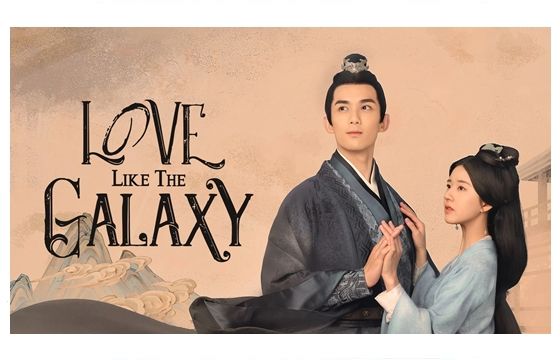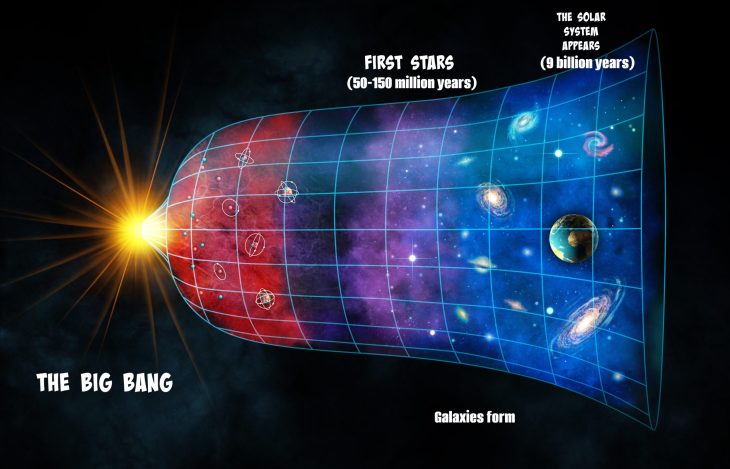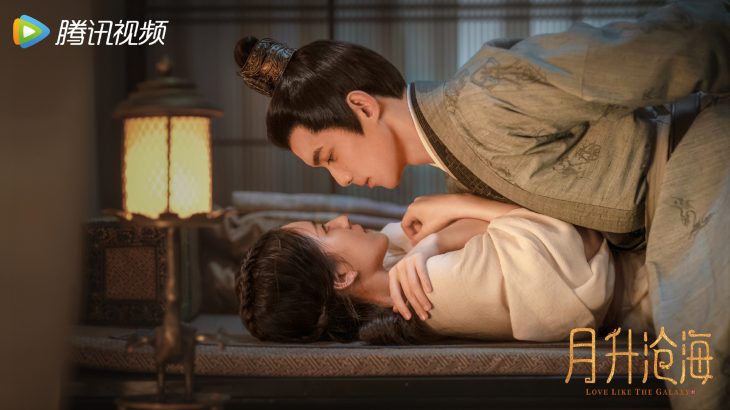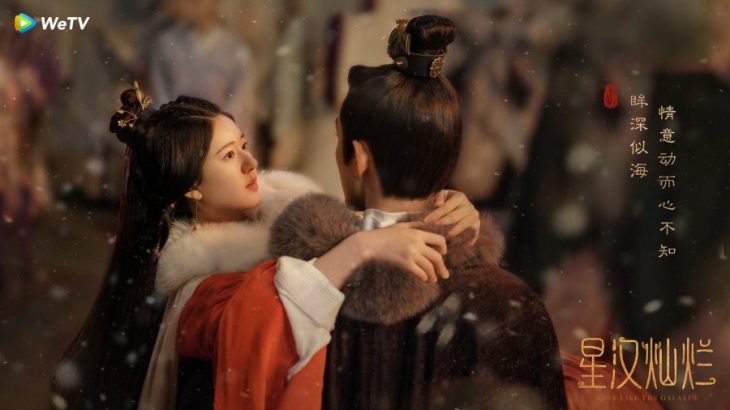The More-Ish Nature of Chinese Costume Dramas

Good afterevenmorn!
I have not all that long ago espoused my love for Chinese Dramas on here. I was gushing about The Untamed, which still reigns supreme for me for a myriad of reasons. Not least of all because I’ve only watched one other all the way through since then. It’s that weird thing when a love for one of the genre makes all others in that genre pale by comparison. I still desperately want a copy of The Untamed on DVD or Blu-Ray for my collection. But I didn’t want to get on here to rehash my old loves for you. Tempted though I am.
I’ve gotten ahead of myself here. Let me start from the beginning.

The whole universe was in a hot, dense state…
Dumb jokes aside, I have a confession to make (it will swing around, I promise). The truth is, I’m up very late writing this blog post in a perhaps doomed (we’ll find out when it’s time to submit) effort to get this to the very fore bearing editor before my deadline. Why was I up late the night before my assignment was due? Bad habits formed in high school that have carried over to the rest of my life.
And also…
I was very ill this weekend. Nothing desperately wrong. Just a flu. But I had the sore throat, headache, fever, runny nose, fatigue… all the fun stuff that comes with being unwell. I spent all of Saturday and most of Sunday fast asleep. Thank you, modern day pharamceuticals! It wasn’t until Sunday evening rolled around that I had the energy to do anything but sleep. I spent that time mindlessly scrolling through YouTube’s algorithmic offerings until I stumbled upon a clip of a new-to-me C-Drama: Love like the Galaxy.
The clip was quite cutesy (not my normal preference) but just intriguing enough that I decided to give the series a go. And, well, it is very cutesy (so far), but has enough depth in it that I’m continually pulled into the story. Enough that I spent this evening pressing the ‘next episode’ button when I should have been writing this very blog post.
See. I told you it’d come back around.

And it has me thinking. This is twice now I’ve taken up a C-Drama and immediately fallen into it, consuming my attention. I did watch another C-Drama, though the name escapes me now. It did have the same actress as the lead female character, and was sort of a portal fantasy type story, but for the life of me, I can’t remember the name of it. I can recite to you the basic plot, but not the title. It did not grab me in the same way, but I did watch the entire thing through from start to finish, so it wasn’t bad, either.
So there’s something, I think, to these stories that keep me glued to the television in the way that other television series do not.
I don’t think that it’s because all of these C-Dramas so far have been romantic. Love like the Galaxy and the other one especially so. An argument could be made that The Untamed was a fantasy, but the romance* sub-plot was so strong it might as well have been the main plot.
*A note about the romance sub-plot of The Untamed. The story can be interpreted as being a gay love story, particularly since the source material was very much that, but thanks to Chinese censorship laws, all of that had to be stripped from the series, leaving only (exceedingly obvious) subtext. It’s, therefore, more than excusable to interpret this story as a deep, abiding but platonic love between dear friends. And however starved the LGBT community is for representation, I want to point out that the A part of the alphabet is more often forgotten, and it’s nice to see a deep, passionate, abiding love that is also platonic in the media. Back to the point.
Part of it, of course, is the sheer beauty of these productions. Not only are the actors all incredibly handsome and or beautiful (seriously. It’s wildly unfair), but the sets, the scenery and the costumes are stunning. Oh lord, I could parrot on all day about the beautiful clothing!
Not a small chunk of it is the novelty of experiencing a culture that is refreshingly different; to live in a world that is filled with customs that are different from my own either in modern times or historically. To watch rituals and celebrations that are far removed from anything I’ve experienced in my day to day is really nice, actually. I enjoy this dive into a different culture very much.

Some of it is the charm of the dramas. There is often a lot of humour involved, and sometimes, even the scenes that aren’t supposed to be humorous, nevertheless get a good giggle. Be it the questionable CGI or physics that sometimes happed in The Untamed, or the way many scenes in all the dramas I’ve watched thus far appear to blocked for a stage in a way that feels rather quaint (if that’s not too patronizing), or the scenes that are sometimes over the top dramatic for no good reason.
In Love Like the Galaxy, for example, the female main character and the male main character have only just met face-to-face some seven episodes into the series (each episode is roughly 45 minutes). The MMC saved the FMC from a falling structure that happened to be on fire. There was a bunch of unnecessary slow motion and a very swishy cape that made me giggle out loud. It was all very dramatic for no reason, and quite silly. Did I eat it up all the same? Shamelessly.
Many of the characters, too, are charming. Even when they’re being over-the-top. The FMC’s grandmother in the same show, for example, is of the same level of annoying hysteria that Mrs. Bennet was in the BBC miniseries adaptation of Pride & Prejudice. Nearly exactly the same sort of character, actually.
Simply put, they all been quite charming in their various ways. That helps a great deal.
Even the romance, which is not a genre I particularly enjoy, is not a drag. In The Untamed, it happened in a backdrop of political upheaval that was actually incredibly dark. The series opened with a battle and a suicide, for goodness sake. Yes, I was hooked. They had me at the very first scene.
So far, in Love Like the Galaxy, we haven’t gotten to the romance yet. It’s about family at present. Well, on the FMC’s side of the story it is. On the MMC’s side, it’s all about solving a very serious crime that threatens the entire kingdom. These two individual storylines will no doubt merge. I’m not there yet. I’m not even a fifth of the way in. I’m not even certain that the romance is the main plot, or just an enormous sub-plot like it was in The Untamed. I’ll report back if anyone is interested.

There are 56 episodes in Love Like the Galaxy. Each is roughly 45 minutes. There are 50 in The Untamed. Each one is about an hour or just less. This led to some very peculiar choices in some episodes of The Untamed, where they cut rather abruptly in a manner and place which didn’t feel like it was good to end an episode. I suspect it was because there was much to tell, but each episode had to be a certain length, and so they had to cut in these weird places or they’d be going too far over time. Was this what made it more-ish for me? What the ending of an episode practically mid-sentence sometimes what made me want to stay up past my bedtime, blow through deadlines and continue watching?
The same hasn’t happened for Love Like the Galaxy (yet… who knows?), and still, here I am, should have been in bed two hours ago, but I’m writing this blog post because I just had to watch one more episode.
And if that sounds like the age-old reader’s promise of ‘just one more chapter,’ you’d be right.
That’s why I think these dramas work so well for pulling me (specifically) in like this. They aren’t like western series, for the most part. They are, in essence, a visual novel. Each episode is more or less a chapter — though books have more flexibility here. Chapter length may vary wildly in books, sometimes being ten pages while another chapter might be no longer than a single paragraph all in the same book. Television shows don’t have that luxury (hence the very bizarre ends to some episodes of The Untamed, I think).
As they do not operate like western television series, there isn’t really a season for the show. Like a novel, they go until the story is told. How many good shows have we lost to mediocrity because they lasted longer than the story writers set out to tell? How much do we love shows that end when they’re supposed to, even if it means we get less time with the characters and in that world (Avatar: The Last Airbender, anyone?)?
I know I can safely dive into a C-Drama without hating it by the end of its seventeenth season, wishing it ended at season five. These dramas are just like novels. And so I just end up watching one more episode, like I do with reading one more chapter.
I really appreciate this approach to visual story-telling, and I wish more productions coming out of the west adopted this kind of series. Imagine the brilliant stories we’d be able to tell if we all just let go of the shackles that are never-ending seasons, and let a story take the time it needs to be told without stretching it so thin it flies apart with the slightest movement.
There is a lot, I think, we could learn by looking at the way other countries tell their stories. Until then, I’ll happily put on another episode. I hope I don’t fall asleep on the couch…
Ciao!
When S.M. Carrière isn’t brutally killing your favorite characters, she spends her time teaching martial arts, live streaming video games, and cuddling her cat. In other words, she spends her time teaching others to kill, streaming her digital kills, and a cuddling furry murderer. Her most recent titles include Daughters of Britain, Skylark and Human. Her serial The New Haven Incident is free and goes up every Friday on her blog.
Bill Watterson is notable for choosing to end Calvin and Hobbes, rather than have it go on and on when he had run out of stories to tell, as happened, for example, with Peanuts. This let him tell some memorable stories that would not have worked if he weren’t ending the strip, because they would have closed off the option of further stories about recurring characters. See for example the Calvinball game between Calvin and Rosalyn, a truly memorable story arc!
That’s the way to do it, honestly.
Have you happened to watch the independent(?) documentary “Dear Mr. Watterson”? It’s all about why and how Watterson made the choices he did regarding Calvin&Hobbes, and the impact those choices have had on the U.S. culture writ large. Albeit the perspective is that of the people who worked with him and the ultra-fans of the time, but it’s still a very good treatment of the topic.
Really enjoyed reading this. Your comparison of C-dramas to visual novels makes so much sense, especially the “one more episode” feeling. I also love how you talked about the costumes, culture, and storytelling style in such an honest way. It made me want to keep watching and appreciating these dramas even more.